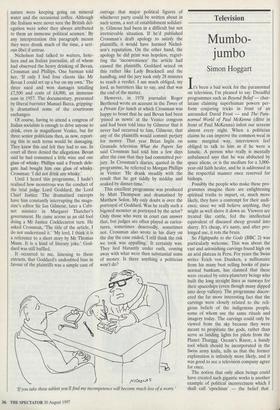Television
Mumbo-
Simon Hoggart
It's been a bad week for the paranormal on television, I'm pleased to say. Dreadful programmes such as Beyond Belief — char- latans claiming superhuman powers per- form conjuring tricks in front of an astounded David Frost — and The Para- normal World of Paul McKenna (ditto in front of Paul McKenna) infest our screens almost every night. When a politician claims he can improve the common weal in some marginal way, interviewers feel obliged to talk to him as if he were a lunatic. A person who really is mentally unbalanced says that he was abducted by space aliens, or is the medium for a 3,000- year-old faith healer, and he is addressed in the respectful manner once reserved for bishops.
Possibly the people who make these pro- grammes imagine there are enlightening spiritual truths to impart, or, much more likely, they have a contempt for their audi- ence; since we will believe anything, they might as well shove it down us. Viewers are treated like cattle, fed the intellectual equivalent of diseased sheep ground into slurry. It's cheap, it's nasty, and after pro- longed use, it rots the brain.
So Flightpaths to the Gods (BBC 2) was particularly welcome. This was about the vast and astonishing carvings found high on an arid plateau in Peru. For years the Swiss writer Erich von Daniken, a millionaire from his many best selling books of para- normal bunkum, has claimed that these were created by extra-planetary beings who built the long straight lines as runways for their spaceships (even though many dipped into deep valleys). The programme discov- ered the far more interesting fact that the carvings were closely related to the reli- gious beliefs of the indigenous people, some of whom use the same rituals and imagery today. The carvings could only be viewed from the sky because they were meant to propitiate the gods, rather than serve as landing lights for pilots from the Planet Tharggg. Occam's Razor, a handy tool which should be incorporated in the Swiss army knife, tells us that the former explanation is infinitely more likely, and it was good to see a television company agree for once.
The notion that only alien beings could have created such gigantic works is another example of political incorrectness which I shall call `epochism' — the belief that ancient peoples, the chronologically chal- lenged, weren't just less technically advanced than us but were incapable of doing anything more artistic than spearing wild animals and hitting each other with clubs.
And the truth tends to be expensive. The programme must have cost quite a lot of money; it showed evidence of considerable research, and you don't get television crews to the top of Peruvian mountains with air miles. One reason why paranormal non- sense gets on the air so often is that it can be knocked up for almost nothing.
Secrets of the Psychics was an Equinox programme for Channel 4 and was, I think, the first show ever to take on the notori- ously litigious Uri Geller. They showed how all his parlour tricks could be easily duplicated by jobbing magicians without any help from paranormal powers, and ran gratifying footage of his humiliation on the Tonight show in the United States (some- one had the wit to use proper controls). Will this excellent exposé stop David Frost using him? I doubt it. And imagine how Sir David would have reacted if Paul Daniels had claimed abilities beyond the laws of physics. He'd have been bowing and scrap- ing as if to a Peruvian god.
After 25 years Mastermind is coming to an end, and I'm afraid it's time. The show, once unmissable, has become a pastiche of itself. This week's semi-final came, improb- ably, from the Old Laundry Theatre, Bow- ness-in-Windermere and the winner, inevitably, was a tense looking woman who had boned up on 'The Duncton Novels'. We weren't told who had written these yarns, but they appear to he mole-orientat- ed, and she knew rather more about them than is good for anyone.
Anyone who takes part in quizzes (that is, almost all the British middle classes) knows that winning is astonishingly impor- tant, that the setters invariably make mis- takes, and that complaining about anything, short of your opponents turning up with a CD-Rom of the Britannia, is thought unsportsmanlike. By my reckoning, the Duncton woman got an extra half-sec- ond on the clock. Magnus Magnusson started his final question at that instant, and she answered it for the winning point. If I'd been the woman who came second (The Regency Novels of Georgette Heyer') I'd have been furious, but of course she had to sit there pretending to be pleased.
Years ago I had the great pleasure of accompanying Magnus on a tour of his native Iceland. He has always yearned to be known for his studies of archaeology and ancient culture, so was pleased when my mischievous colleague Ed Steen said earnestly, 'Magnus, there's something I've always wanted to know."Yes, yes!' he replied eagerly. 'What's Fred Housego really like?', asked the cruel Steen, and poor Magnus looked miserable. I hope he will be happier now.



















































 Previous page
Previous page